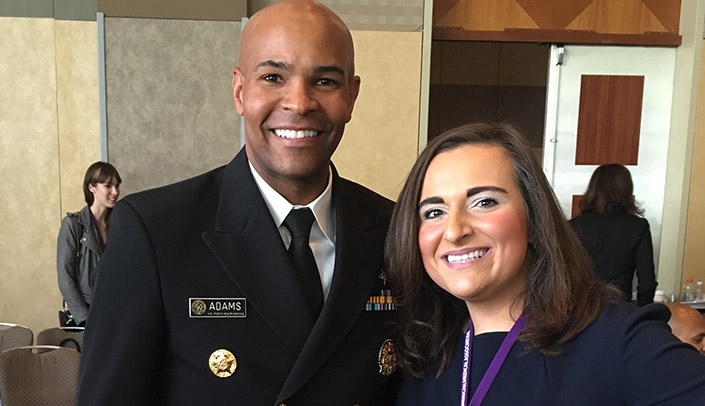Alëna Balasanova, M.D., director of addictions psychiatry education at the University of Nebraska Medical Center and assistant professor in the UNMC Department of Psychiatry, was responsible for getting a resolution passed by the American Medical Association dealing with destigmatizing language as it pertains to addiction.
In the process of getting her resolution passed, Dr. Balasanova received support from a surprise visitor -Vice Admiral Jerome Adams, M.D., the surgeon general of the United States.
Dr. Balasanova submitted her resolution through the Young Physicians Section to the AMA Science and Technology Reference Committee at the 2019 Annual Meeting of the AMA House of Delegates, which was held June 8-12 in Chicago.
Dr. Adams made a surprise appearance in front of the committee to speak in support of the resolution, which directs AMA members to use clinically accurate, non-stigmatizing terminology in all resolutions, reports and educational materials regarding substance use and addiction.
Dr. Balasanova called the surgeon general's testimony a shock.
"I knew he was at the meeting, but I had no idea that he was going to show up to my reference committee specifically to support this resolution," she said.
"It was very validating. He shared, very candidly, a story about his younger brother, who has mental illness and substance use disorder and is incarcerated, and he spoke about the importance of reducing stigma, and how sharing his story will help do that as well, because this can afflict anybody if it afflicts the surgeon general's brother."
Afterward, Dr. Balasanova told Dr. Adams that she had written the resolution. The surgeon general acknowledged her by giving her a high-five.
Dr. Balasanova was inspired to write the resolution by a 2016 article in the Journal of the American Medical Association article on changing the language related to addiction.
"It was there that I actually first learned just what power our words can have," she said. "I always thought it was important to be saying the right things, but I didn't know it could actually impact patient care. When I learned it did, I really started taking measures to try to change the way I talk about things and really impart this to medical students and residents."
Dr. Balasanova first wrote a resolution to the Nebraska Medical Association (NMA) through the Metro Omaha Medical Society. When it passed unanimously in the Nebraska Medical Association, she decided to modify it for the AMA.
"The testimony before the committee was unanimously positive, as well," she said.
With its passage following the testimony, Dr. Balasanova's resolution becomes national policy on behalf of the 200,000 physicians who are part of the AMA, the most influential physician group in the country and the world.
Dr. Balasanova’s resolution called for physicians to use the terms substance misuse (instead of substance abuse) and substance use disorder (instead of substance abuse disorder).
“I feel really passionately about this subject as an addiction psychiatrist," Dr. Balasanova said. "I'm also very interested in social determinants of health and how stigma plays a role in that. There have been a lot of studies published in the literature about how the words that we use to describe patients will actually impact the way in which we care for them, whether we realize it or not.
"It causes an unconscious bias. Studies have actually directly compared what it's like to have somebody described as a patient with a 'substance use' disorder vs. a patient with 'substance abuse.' They have found that clinicians respond differently; they actually agree with the need for more punitive measures if it's 'substance abuse,' and also agree more with withholding delivery of care, which of course is not something we want to see for this patient population or any patient population."
We are Nebraska Medicine and UNMC. Our mission is to lead the world in transforming lives to create a healthy future for all individuals and communities through premier educational programs, innovative research and extraordinary patient care.
Twitter | Facebook | Instagram | YouTube | Flickr
UNMC psychiatrist connects with U.S. surgeon general at AMA meeting
- Written by Tom O'Connor
- Published Jul 12, 2019

Vice Admiral Jerome Adams, M.D. (left), the U.S. surgeon general, with Alëna Balasanova, M.D., of UNMC.
Media Contact
Tom O'Connor
UNMC Public Relations
(402) 559-4690 (office)
(402) 650-7063 (cell)
toconnor@unmc.edu
John Keenan
UNMC Strategic Communications
(402) 559-8329
(402) 559-4353
john.keenan@unmc.edu